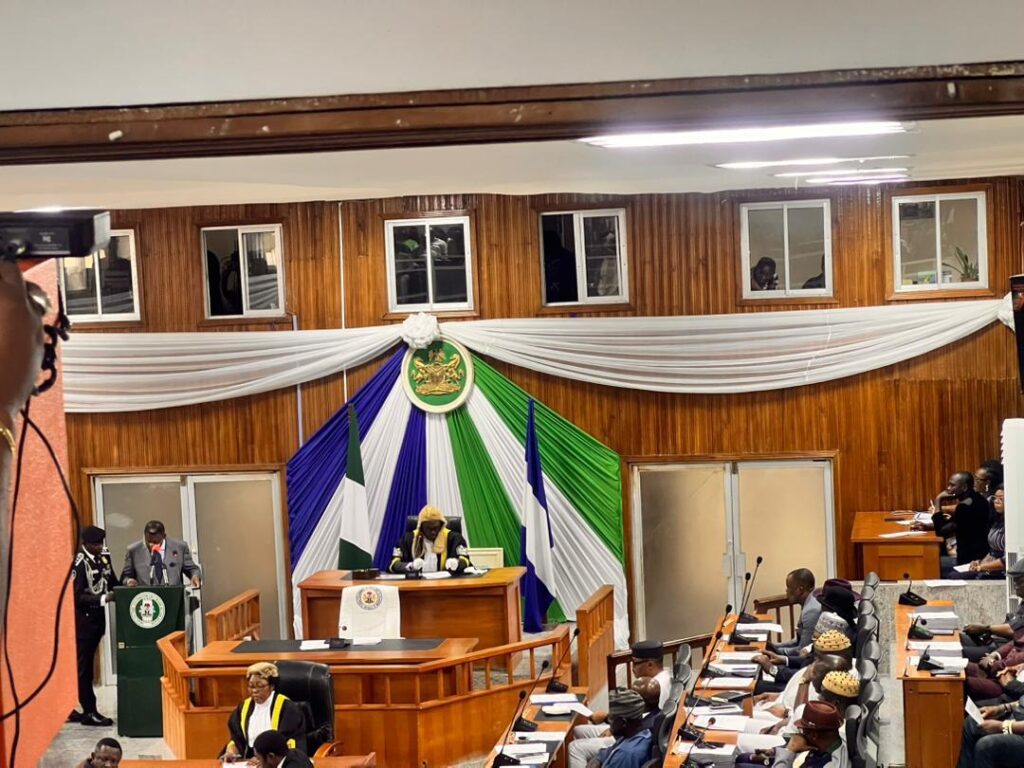Cross River State Governor, Senator (Prince) Bassey Edet Otu, on Tuesday presented a ₦780.59 billion budget for the 2026 fiscal year to the State House of Assembly, describing it as a “Budget of Inclusive Growth” aimed at consolidating the gains of his administration’s People First philosophy.
Presenting the Appropriation Bill before lawmakers in Calabar, Governor Otu said he approached the task with a profound sense of duty and determination to advance the development of the state. He noted that the annual budget presentation was not a mere bureaucratic formality but “a sacred social contract between government and the governed, a public declaration of our collective intent to enhance the well-being of our people.”
Unveiling his 2026 fiscal vision, the governor said the budget was the outcome of broad consultations with civil society, private sector stakeholders, NGOs, and the general public. He added that his administration would henceforth measure development through the Human Development Index (HDI) rather than Gross Domestic Product (GDP).
“We will judge progress by how much better our people live, learn, and thrive,” Otu said, promising expanded access to education, healthcare, and electricity for rural entrepreneurs.
According to him, the proposed ₦780.59 billion budget represents a 17 percent increase over 2025 figures, with ₦519.6 billion (67%) allocated to capital expenditure and ₦260.96 billion (33%) for recurrent spending. Sectoral distribution includes ₦421 billion for the economic sector, ₦163 billion for social services, ₦164 billion for general administration, ₦28 billion for law and justice, and ₦3.6 billion for regional development.
“This budget is designed to strengthen our revenue base, drive human capital development, and secure a prosperous, peaceful, and resilient Cross River State,” he declared.
Reflecting on the 2025 fiscal performance, Otu said last year’s Budget of Sustainable Growth was revised from ₦538 billion to ₦642 billion following improved revenue inflows and prudent resource management. “We cannot spend an extra kobo without the legal instrument of appropriation,” he said, affirming his commitment to transparency and fiscal discipline.
He explained that the supplementary budget addressed urgent interventions in road repairs, rural electrification, and counterpart funding for national and international projects, including the Maternal and Neonatal Mortality Reduction Initiative.
Otu described the 2025 budget performance as “one of the best in the country,” noting that Cross River ranked first nationwide in routine immunization coverage with 95 percent. He highlighted key infrastructure projects such as the Adiabo–Ikoneto Road, dualization of the Esuk Utan–Depot Road, and the Yahe–Ebo–Wanakom–Wanikade corridor.
He also pointed to major strides in the power and health sectors, noting that cities had been illuminated with solar-powered streetlights, rural communities energized with mini-grids, and health facilities upgraded across all senatorial districts. “Every School of Nursing in Cross River has now met accreditation standards,” the governor said.
On infrastructure and logistics, Otu revealed that construction of the Obudu Passenger and Cargo Airport was nearing completion, while negotiations for the Bakassi Deep Seaport were advancing. “We are not just providing infrastructure,” he said, “we are building the future, restoring Cross River as a maritime and logistics hub in West Africa.”
The governor further disclosed that his administration had implemented the national minimum wage across all tiers, cleared the first tranche of gratuities for retirees, and commenced payment of the second. He added that fibre optic connectivity had been extended across MDAs for efficient service delivery, while land administration had been digitized with resumed issuance of Certificates of Occupancy.















